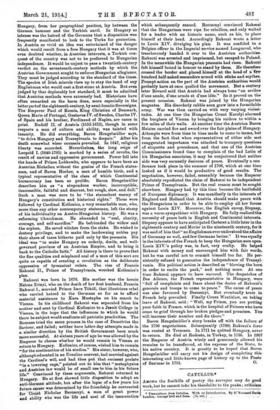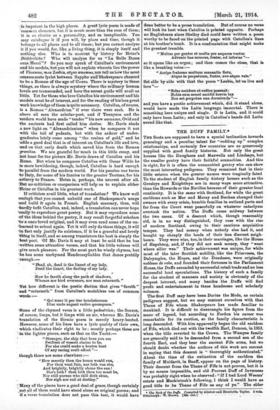CAT [ILLUS.
AMONG the foothills of poetry the surveyor may do good work, but he cannot take his theodolite to the peaks ; criticism • Trtvas«ttiana front Catalina. With as Introduction. Ny licanasd Loadotii Georgette' 10Ia Soma. Pa. ne.t.] impotent in the high places. A greet lyric poem is made of 'common elements, but it is much more'tlran the sum of them; it is as elusive as a personality, and as inexplicable. You may catalogue it if you will, by place and time, though it 'belongs to all places and to all times; but you cannot analyse it if you would, for, like,a living thing, it is simply itself and nothing 'else. Who is to amen:lit by history for Heine's Dicliterliebe I Who will tenilyse for us "La Belle Tlame sans !demi"? So you may. speak of Cattilltues environment and Ms modela-Mityou will not explain' vrherein lies the-power :of Rooms, nteo-Letbia, okra ennemas, hen. tell us how the most :onnsum mate lyrist between •Sappho-and'Sindteayreare ehatited 'to be a Roman 61 the-age of Cicero. There is Mystery in'theie -things, as-there is always mjmterrwhere thmordinctry human. letels are transcended, and herethe'sorest guide will avail us 'little. Yet for those who love Candles his-environment and'his "models must be of interest, and for the reading of hinless great work knowledge of them irgeite necessary. Catullus, of bourse, • is a Roman "Alexandrian" if ever there were such. -He is 'above all men the schtdavpoet, and if Tetinysion and the modern World have made "tender "Iis-new surname, Ovid and -the ancients bad 'first called 'him doetus.. Mr. Davis Sheds a new light on "Alexandrianism" when he compares it not with the toil of pedants, but with the ardour of under- graduates lately come among "the realms of gold," and he 'adds a good deal that is of interest on Catullus's life and love, . and on that early death which saved him from the Roman • rravitee. We are grateful for'much in this little essay, and not least for the picture Mr. Davis draws of Catullus and his Rome. But when he compares Catullus with Oscar Wilde he 113 mote bewildering, though, indeed, Catullus is bard enough to parallel from the modern world. For his passion one turns to Italy, for-some of his fa:Mimi-to the greater Teutonalor his 'sultan"' toPtance. Heine is, perhaps, the nearest after all. 'Ent neemiticiam or coutparison will help us to explain either Heine or Catalina in his greatest work.
If criticises avail little, what of translation P We know well mtufugh that you cannot unbuild one of Shakespeare's songs atnd build it again in French. English masonry, then, will -hardly befit Catalina, and, indeed, a translation can never hope. 'really to reproduce' great poetry. But it may reproduce some '6f-the ideas-behind the poetry, it may recall forgetful scholars 'to a once-loved original, and it may even send some of the on- "leartredlo-sehoial again. Yet It will only do these things, it will 'in fact only justify its existence, if it be a graceful and lovely 'tiring in itself, and so among translators the best is simply the -hest poet. .01 Mr. Davis it may at least be said that he has -written 2.01122 attractive verses, and that his little volume will give much pleasure. For the most part be wisely rhymes, but 'Le has some unrhymed Hendecasyllables that dance prettily "enough :— '"Ilead, ah, dead is the linnet of my lady,
' Dead the linnet, the darling of my lady.
• • • • • • • 'Now he &nth along the path of Shadows, -Whence nor bird evermore, nor man returneth."
mit how different is the poetic diction that gives "lareth **Yeturtketh" from Catullus's matchless use of common. *tilde :-- • " QUi'/IIIIIC it-per iter teriebricesum Blue undo negant redire quemmtam."
Borne of the rhymed verse is a little pedestrian; the Season, of course, limps, but it limps with an air, whereas Mr. Davis's 'translation of the Sirmio poem is merely heavy-booted. However, some of his lines hare a lyric quality of their own, Which vindicates their right to be : mostly perhaps these are 411 the lighter pieces, such as that on the Yacht:—
" Stranger, the ship that 'here you see Swiftest of vessels claims to be, For she could make a beaten boat
Of any racing craft afloat "-
- they& there are some elsewhere:— • "How merrily then the hours would run, . For thou west fain, nor loth was she, And brightly, brightly shone the sun I She's loth? then loth thou too must be, Nor still pursue who still doth shun, Nor sigh.nor rail at destiny."
'Many of the pieces have a good deal of grace, though certainly .stotall of them could have stood alone as original poems; and if a verse translation does not pass this test, it would have done better to be a prose translation. But of course no verse will look its best when Catullus is printed opposite. Perhaps no Englishman since Shelley died could have written a poem worthy to be faced Ott the printed page with Catullus's lines at his brothers' tomb. It is a confrontation that might make the greatest tremble.
"Mattes per genies at mutts per sequoia vectus Advenio has miseree,frater, ad inferias "—
so it opens like an organ; and then comes the close, that is like a breaking voice :—
" Aecipe fraterno multum manantia fletu, Atque in -perpetuuna, fmter, aye &Mine vale."
Set side by aide with that the poem " Leabia, let us live and love "-- " Soles. °widen,- et ream posetint Nobis cum semel meidit brevis lux Nor est papetua tins dormiende"—
and you have a poetic achievement which, did it stand alone, would have made the Latin language immortal. There is something here unique and single. It is Latin, and it could only have been Latin; and only in Catullus's hands did Latin
sound like that.











































 Previous page
Previous page